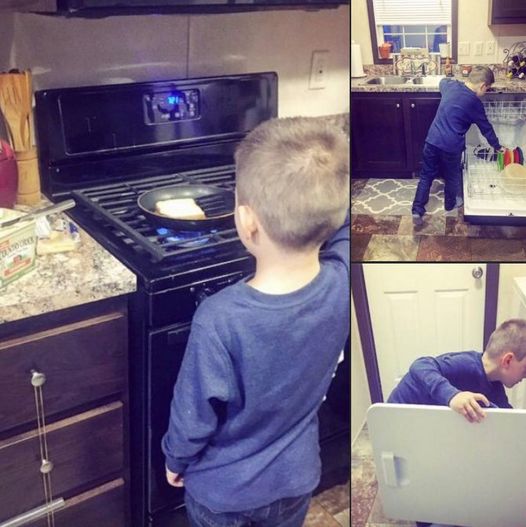
How we choose to raise our children and the lessons we decide to ingrain in them from an early age differs from parent to parent.
It’s only natural, of course. Some mothers and fathers take a more disciplined approach, for example, while others prefer to let their kids go through a try and fail cycle so that they can learn right and wrong through their own experiences.
Now, for the most part, how one chooses to style their son or daughter’s upbringing is their business, no one else’s. Yet that doesn’t stop people commenting and criticizing online every time a debate is sparked over some parental decision or another…
I remember when I was younger, doing chores was considered part and parcel of everyday life. I mean for me and my siblings, of course, not only my mother.
Doing dishes, making beds, helping to prepare food before mealtimes… the list goes on and on.
I understand times change, but in my mind getting children to help out with tasks around the house – providing there’s no danger involved – is a great way to instill values and a worth ethic that will come in handy later on.

It seems, though, that not everyone agrees. According to reports, one mother found this out the hard way a few years back after she uploaded pictures of her son and shared her method of giving him chores to do with the internet.
The mom in question, 22-year-old Nikkole Paulun, reportedly explained how she proudly put her 7-year-old son, Lyle, to work around the house, where he would help out with things like cooking and cleaning.
Nothing too dramatic, I’m sure we can all agree, but that didn’t stop online detractors from verbally attacking her and expressing concern over the potential impact on the child’s emotional well-being.
The bulk of the critics targeted the fact that the mother had shared her son’s chores online, not only potentially making other parents question themselves, but also flagging the idea that the child might not want to have his daily activities shared with a large number of strangers online.
One woman went as far as to write in the comments that Nikkole couldn’t just let her child “be your slave. Or to do the chores that you yourself don’t want to do.”
Another wrote: “So I take it you can do everything ur teaching ur son to do or are you just putting pressure on ur child?”
A third added: “Don’t get me wrong… a child should know responsibility. .. but should not be operating a stove that young.“
A fourth wrote: “Lazy mother’s are sweeping the country. It’s good to teach them while they’re young but i notice alot of these single mom’s are just raising their boy’s to be the man that they wish they always had.“
There were many who defended Nikkole in the comments, too, with her post gaining viral status after it garnered over 8,000 comments and 156,000 interactions on Facebook.
Nikkole herself insisted that she enjoys doing housework and that her son Lyle “just helps along the way & earns allowance as well.
What’s more, she added that her then-one-year-old daughter, Ellie, would be following in her elder siblings steps and doing the same thing when she was a little older.
What do you think to Nikkole’s parenting approach and the criticism she got for it? Let us know your thoughts in the comments box.
In the interest of the saint, please stop reversing into parking spaces!
Reversing into a parking space often seems like a good idea, but it also comes with some challenges. It can be difficult to judge the space required and maneuver safely, and there’s a chance you might miss something important in your reversing alerts, leading to potential accidents. Even with modern safety technology, reversing into tight spots can still be prone to error. Aside from the safety concerns, it can also be frustrating for other drivers to have to wait while you slowly back into a parking space, especially in crowded parking lots. In some places, reversing into a parking space is even prohibited due to the risks involved.
When reversing, drivers need to be extra aware of their surroundings, especially in high-traffic areas or busy parking lots. Without backup cameras or warning systems, maneuvering can be difficult. Newer cars may have cameras to help with this, but not all have these features.
Reversing into gaps can be dangerous because many drivers lack the skills to do so safely. Aside from battling with other vehicles and pedestrians, it’s also easy to miss obstacles. This can lead to serious accidents involving both drivers and pedestrians. Additionally, taking up more than one space when reversing is inconsiderate of other drivers, and in tight parking lots there may not be enough room behind you to maneuver safely. Even the most skilled reverse parkers often take longer than those who park upside down.

Ultimately, the potential risks and delays often outweigh the perceived benefits of backing into a space. Head-first into a parking space is generally safer and more convenient for everyone. It provides better visibility and minimizes the risk of collision or damage to vehicles. For larger vehicles or pickup trucks, backing into a spot can be particularly challenging due to the size and location of the spot relative to other vehicles.
In some areas, reversing is not permitted for safety reasons. Without visible brake lights when reversing, other drivers and pedestrians may not see you stop, increasing the risk of an accident. While reversing is possible in some winding parking lots, it is often a nuisance and a potential danger to those around you.
In summary, reversing into parking spaces can be risky and often not worth it. It can cause accidents, inconvenience other drivers and even result in parking tickets. For safety and convenience, it is best to park head first.



Leave a Reply